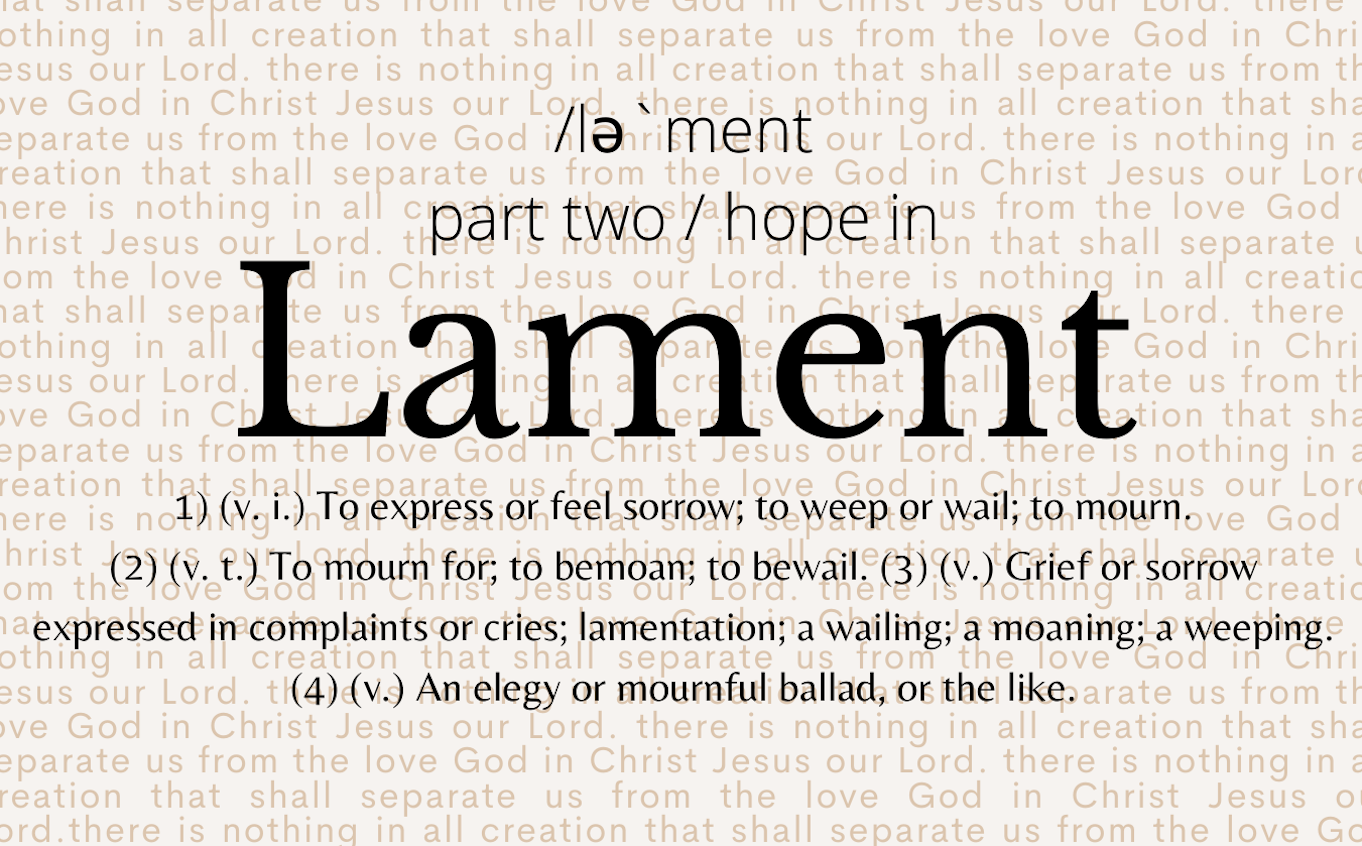Anne Lamott’s difficult relationship with her mother continued even beyond her death. After she died, Anne searched for clues to understand her better. One thing she did was to go through her mother’s purse. She found that it was jammed, as it always had been, with Kleenex that her mother used for everything but tears. Lamott said:
My mother almost never cried—her parents were English—so the Kleenex weren’t to wipe her tears, and she had drowned in those uncried tears. Uncried tears syndrome left my mother hypervigilant, unable to settle down into herself and—to use the clinical term—cuckoo.” (Plan B. NY: Riverhead Books, 2005, 49)
The practice of lament rescues us from drowning in our uncried tears; it provides structure, permission, and language for us to feel what we truly feel and to say what we most need to say. We engage in lament because we recognize that it is the tears we do not cry that cause us trouble.
Uncried tears become a dank swampland of numbness, a fetid cesspool of despair, and a stale well of apathy. We need to let our tears fall so that, beneath and within them, we can drink from the “rivers of living water,” the refreshing springs of the Spirit, that flow from deep within us (see John 7:37-39).
Lament is most likely to be helpful and healing when it is accompanied by other acts of worship and various forms of prayer. Only rarely should lament stand-alone, or nearly alone, as a practice. The God to whom we lament is also the God who wipes away every tear from our eyes. We complain to the God whom we also praise. We cry out, with Jesus, “My God, my God, why have your forsaken me?” and, when we take our last breaths, we say with him, “Into your hands, I commit my spirit.” Spirit-sustaining and heart-healing prayer admits our pain and acknowledges our gifts. The Elder James taught:
Are any among you suffering? They should pray. Are any cheerful? They should sing songs of praise? [James 5:13].
Lament is most honest when it acknowledges that, while life can be brutal, it is also beautiful. There are almost always reasons to grieve and to give thanks. There are causes for despair, and there are glimmers of hope. There are times for cross-shaped ashes on our foreheads and times for the cross to be traced with consecrated oil, a sign of healing. We pray, “I believe,” closely followed by “Help my unbelief.”
Joy and sadness often come together. We weep at weddings and laugh at funerals. We laugh until we cry, cry until we laugh, and laugh to keep from crying. Lament flourishes in conditions of memory and promise: we remember hard times through which God has brought our forebears and us, and we affirm that God has pledged to be with and for us, even when we feel that God is distant and disengaged. We say what hurts to the God who heals. We protest what is wrong to the One who has come in Jesus to set things right. Lament finds its place among praise, silence, confession, intercession, and surrender of the will to God’s goodwill.
Lament should be a regular part of our gatherings for worship. Worship leaders can draw phrases and images from biblical psalms, from other songs and hymns, from current expressions of pain and protest, and from their awareness of struggles within the congregation and world to shape prayers that speak from the worshipers’ broken hearts to the broken-but-healing heart of God. There can also be time for worshipers to name aloud their own wounds and worries and to feel heard both by God and by their fellow congregants.
An individual might practice lament by composing a prayer that reflects one’s struggle in a particular season. This past December, reeling from the crises of the last few years and experiencing profound weariness as I continued to wrestle with an illness, I wrote the following lament. Maybe it can prompt your own.
Inexhaustible God,
I am weary. And weary of weariness
Healing God,
I am sick. And sick of sickness.
Sister Fanny Lou Hamer said she was
“Sick and tired of being sick and tired.”
I am. Many are. The earth is.
Cancer kills because it will not die,
cancers of
blood, bone, breast, and brain
prostate and pancreas
kidney and colon
liver and lung
throat and tongue
malignancies of
deception and suspicion.
illusion and separation.
Fear shatters because it will not yield,
fears of
power and weakness
inability and vulnerability
freedom and responsibility
not enough and too much
being alone and never alone
remembering what hurts and forgetting what heals
laughter and joy.
dread of
loss and tears
the outsider and the other
shadow, darkness, and dark
the unknown and the unknowable
living death and dying before living.
Hear our sighs rising from beneath words:
We’re sick and tired of being sick and tired.
Damn sick. Damn tired.
And You?
You give a damn, don’t You?
Damn, we pray, illnesses of body, mind, heart and spirit.
Damn diseases of community, culture, and creation.
Damn false fear and fretful fatigue.
It’s either prayer or surrender,
so we surrender to prayer and in prayer:
Give us courage to die to death.
Gentle our anxieties.
Anew and again, persuade us that you love us.
Draw from us love for neighbors, strangers, and enemies.
Lure us to love Your creation and Your creatures.
Fashion us to be Your partners in working for justice,
Your collaborators in making peace,
and Your companions in showing mercy.
Jesus,
Your truth frees.
Your way is peace.
Your touch heals.
Your presence is rest.
O Jesus,
I believe; help my unbelief.
I trust; restore my broken trust.
Amen.

Thank you, Guy, for giving a voice to our laments this Eastertide. May the peace of Christ rest deeply with you.